Thriving at Work
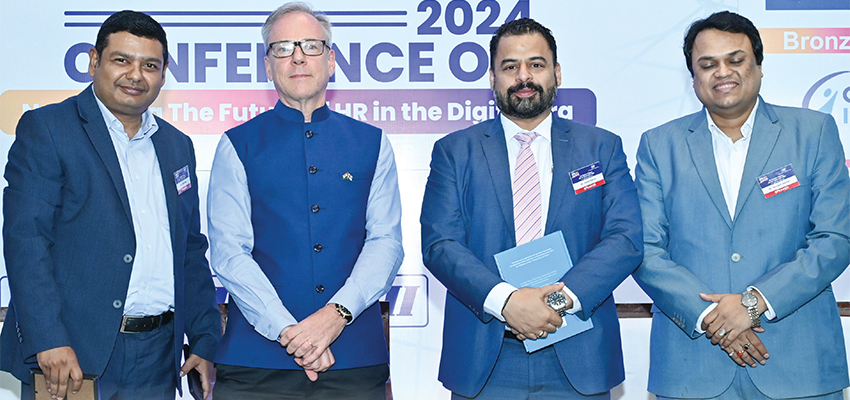
Excelling and growing in your role in an organisation occurs through the exceptional employee experience and wellbeing. The overall physical, mental, emotional and economic health of the employees is called as employee wellbeing. The new generation of employees expect their companies to provide interesting, motivating and engaging work experience, for their career growth. Confederation of Indian Industry (CII), Western Region recently held a one-day conference in Mumbai, wherein session panellists discussed on the topic of “Thriving at work: Crafting an exceptional employee experience and employee wellbeing”, giving their views and the measures being taken in their organisations in this regard. Corporate Citizen brings you excerpts from this discussion
Vishal Kamat: To start with, tell us your views on the topic, "Employee experience and employee wellbeing".

Erik Af Hällström: I would like to put forward the concepts of creativity and cooperation. People in Finland, feel that it is important to encourage employees to think of creative solutions and to take everyone on board. It should not be one-sided affair or process, telling them what to do and about conditions at work. We believe that everyone should be able to invent new practices with regard to digital solutions, artificial intelligence(AI) and also other daily practices, in order to improve our own and other working community results. Co-operation also means that we achieve our results together. The working community is after all a collective entity. It is very seldom that only one person is responsible for something. In Finnish public sector we try to extend Nordic model to working life wherein everyone is entitled to a certain level of social security and dignity. In working place everyone has the right to put forward new ideas. Everyone has the right to complain and to be heard about issues concerning themselves. There is zero tolerance towards any kind of bullying or harrasment in the workplace.
Sourabh Deorah: Retention of the employee is very important and will happen only if we create a right culture and give employees the right experience. In an organisation there are different generations of people working together. It’s very challenging as an organisation to create an environment for all the generations working there, to not only to collaborate but to also have a fulfilled experience while doing their job.
Q: Considering your (Sourabh Deorah) industry what exactly made you to enter it? What has been your learning curve? What can the audience take from it?
Sourabh Deorah: I felt I had an exceptional employee experience while I was working in the Microsoft’s Redmond office in US. We thought that this whole employee experience of corporate branding, brand association as well as the better experience, that we have as an employee in certain campuses in US, which were known for it like Microsoft’s Redmond (in Seattle), Google’s Mountain View (in California) etc—is really not global. Employees working in every organisation feel smart and think their organisations are doing amazing things, then why the employees don’t feel the same in every organisation? This was the basic essence behind starting the Advantage Club. We started it as an employee and non-HR side of things of the job.
We realised especially in the past few years that focus time of every person has really reduced and here things like gamification can play a very important role.
Today, job is not just a transaction where you are doing some work and you are getting paid for it, but people do expect to feel delighted while they are doing it. They are motivated with things beyond money as well, they want to be recognised for what they are doing, plus at the same time human tendency is not just limited with overall objective, they want to be incentivised and motivated for lot of micro goals. Right amount of gamification can help you really achieve that.
Q: From employee perspective what Mahindra Integration has been doing?
Jaydip Dhar: When an employee joins an organisation, first to make him happy, we have to ensure that he is aligned with the vision and mission of the organisation, which we do through business score card or goal setting. In Mahindra, our organisation is there across the scale and industry. Also in diversity and giving back to the community, we always ensure that the employee is aligned with the organisation and we take care of him.
Q: Countries like Finland and others in that region have been forward compared to India in terms of work-life balance, society or family and work, coming together. So what you can share from your government side, that has been done in terms of wellness and behaviour?
Erik Af Hällström: It’s not only us telling about our model to India. It is also about Finland and Nordic countries learning from India. There is much we can learn about India like motivation at work and discipline. About balancing family and work, workers are also very committed to the limitation of working hours of eight hours per day and maximum of 40 hours per week. It is seen as little bit rude to disturb an employee in the evening or especially during the summer holidays. In most sectors it’s like we do work only during working hours. In Finland, normally both parents work for eight hours and they have to leave their workplace early, as the day care centres where their children are kept, close at 4 or 5 pm. So, it is not beneficial for anyone to stay at workplace after 4 to 5 pm.
We really value our free time. Even our newly elected president, Alexander Stubb, has said that the 24 hours of a day are divided into three parts of eight hours each, for rest, work and free time. But, sometimes there can be a need to work for more time, and many people such as private shop owners or others can work for longer hours in our country. But, generally in public sector and bigger enterprises, we have agreements between the employer organisations and employees trade unions, to establish rules for work-life balance.
Q) Finland has social welfare department called 'WORK2030'? Would you like to elaborate on that?
Erik Af Hällström: The "WORK2030" was a programme that was started during the last government under Prime Minister, Sanna Marin. It’s an ambition, a goal. Finland always wanted to be the best in the world. We are the world’s happiest country and now we want happiness in working life too. We believe that a good working life and active employees also contribute to the result in most sectors. There are negotiations between governmental organisations, employer organisations and trade unions, who look at various aspects of working life and try to come up with new solutions.
Q: In Mahindra, do you have people with various disabilities and what about their experience and wellness in general?
Jaydip Dhar: We have and we do encourage physically challenged people to be part of the group and they work in many areas like providing accounting services or HR services or in factory. They are really committed, intelligent and do their work very diligently. We are blessed to have them in the organisation—we are very supportive and always encourage it.
We take care of our physically challenged employees in any area they want, by giving special training. They perform very well. We don’t do any separate thing for them or to show that they are different from others. Just support them with their natural skills and normally they don’t need anything else. They are much intelligent. They can take care of their work and they are the smartest persons in the group.
"It’s not only us telling about our model to India. It is also about Finland and Nordic countries learning from India. There is much we can learn about India like motivation at work and discipline"
-Erik Af Hällström
Q) Have you solved anything in your app for your clients on this issue of diversity?
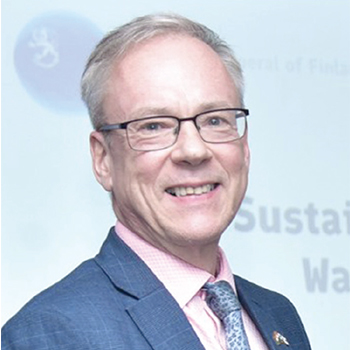
Sourabh Deorah: Diversity plays a very important role and disability is a sub-part of it. We have seen that organisations also create clubs for such people, to interact with each other and discuss their problems with the relevant stakeholders. So on our platform, we have seen cases where people have created disability clubs.
Outside India, you will also see things like Bright Clubs, especially from the diversity point it becomes very relevant. Also the right amount of recognition for such people can go a long way. It’s even more important to give confidence to this group of people that they can perform well. Older organisations follow these things on the platform to achieve that.
Erik Af Hällström: In European Union there have been social equality programmes, kind of affirmative action—the public sector pays half of the salary of the person if the company takes a debt or winds up.
Q) What is your look on mental wellness of your employees in Mahindra?
Jaydip Dhar: It may be office stress or something personal. First thing is that we ensure that employees are well attached with the work they do, like through work appraisals and more discussions with manager and sub-ordinates. We ensure that it is done and if any employee feels uncomfortable or has any issue in the work then they can always go for skiplevel meetings, and we organise skip-level meetings as well. Most of the leaders have open door policy, so if anyone has any issue then they can always come and talk to the leader. Also, if somebody is in any trouble then there are counsellors for it. They can also send anonymous feedback.
Q) How is it that your app is helping both the employees and HR, to have good mental health?
Sourabh Deorah: There are three legs to our problem. First is identification, second is intervention and third is generally a culture where people are happier with their life. The root of mental wellness problem is the way the life has changed. Now we are on phone for work, for 24 hours.
So, it becomes very important for the organisations to recognise mental wellness problem. As a platform we have a feature called Moodometer which measures the happiness index of an employee on a daily basis and will ask them to give a feedback, also read some of their activities to understand where they are in terms of mental space. We encourage organisations to usually help employees to interact outside work as well. Because that’s something that has really changed.
Lot of people do not have a community member or a friend that lives close by, so they can practice their hobby or follow their interest. Something which can be fulfilled by office colleagues. Personally I love playing table tennis, but it’s very hard for me to find someone to play with me, unless I have my work colleagues with whom I can do that. So, there can be ways of stress bursting. Beyond work you can interact with your colleagues. That’s something also we help with.
"In an organisation there are different generations of people working together. It’s very challenging as an organisation to create an environment for all the generations working there, to not only to collaborate but to also have a fulfilled experience while doing their job"
-Sourabh Deorah
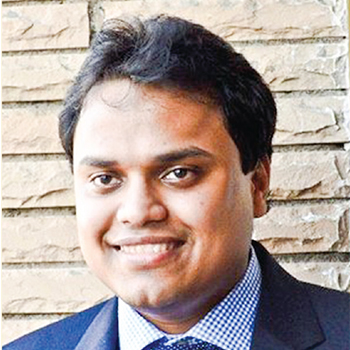
Generally, most of the organisations should have counsellors for the employees and that has to be anonymous. That’s the reason we don’t do it because for us it’s very hard to create an anonymous set-up as we already know who the employee is. But, that is something I believe that every organisation should have.
Then there should be a positive culture which appreciates and does more positive motivation instead of negative motivation. If we do some of the basics right, then we can have a happier workforce which probably does not have to go through mental wellness issues.
Erik Af Hällström: Mental wellness is not only related to workplace. It can come from personal life, frustration and disappointment in personal life. It’s important to have certain agreed rules of behaviour at workplace like work appreciation and to greet every morning saying 'Good Day', 'Good Morning' and 'How are you', and to care about each other. Not to yell, even if you happen to be angry on a certain day. Nowadays we are on phone or computer for long hours every day. Maybe it should be a good idea to try to avoid it.
Talking about India’s strength to combat mental illness-there is much more spirituality and family togetherness here than Europe or Northern Europe, where I come from. All Indians, I have become acquainted with have close relations with their mother or father or siblings or cousins and so on. You can rely on this strength if you have any problems in mental life.
Q) Finding your higher purpose as an individual is crucial in the evolution of each person. How can companies help individuals in this case as part of their wellbeing and long term engagement?
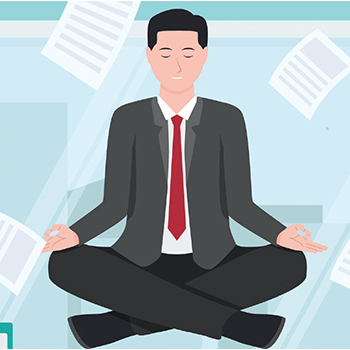
Jaydip Dhar: The organisations need to take care of their employees by providing proper health care facilities, which is very important. Secondly, for their career growth and peace at work, ensure that skills and experience of that person matches with what they are doing. Move most of the mundane jobs to Robotic process automation (RPA) or automate that work. This can help the person in career progression, and the person knows where he/she is and where they can move. Organisation can also guide and train employees properly, so that their future aspiration matches the organisation’s requirement, and also help an employee to grow in the organisation.
Sourabh Deorah: If you look at historically, people earlier were working for survival, then it became about security, then people like us worked for belongingness, which meant to work for organisation’s vision. That’s what lot of the leaders today talk about because that’s what motivated us. Today, maybe employees are working for credit and recognition, but the future looks for actualisation which comes from spirituality, the bigger purpose why every company exists. So, it’s practically employer’s job to first identify what is that bigger purpose. It cannot be earning money for sure. To give an example, in our organisation the bigger goal is to make workplaces happier, that’s what gives us delight, that’s why everyone who is coming to office every day is doing that.
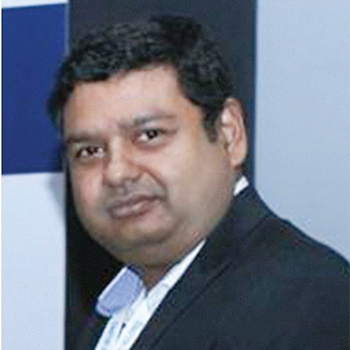
It is very important that you ultimately identify what is the bigger purpose for your organisation to exist and of course leaders would know it. But, it’s more important for leaders to communicate that to every employee that what’s the impact of whatever they are doing. If we can get that message across and people are motivated for it, then you will find the people who are driven by the purpose.
Erik Af Hällström: For example, we have annual target and feedback discussions between the boss and the employee, where the idea is also that employees can discuss his/ her problems and criticise the working culture, of course if needed and together they can agree on the way forward. Another example is, the employees have an annual planning or recreational day where the whole team or work unit can go together out in the nature and discuss something related to work and just to have fun together, or to get to know each other also on a personal level.
"The organisations need to take care of their employees by providing proper health care facilities, which is very important. Secondly, for their career growth and peace at work, ensure that skills and experience of that person matches with what they are doing"
-Jaydip Dhar
The Importance of ‘Why?’

Vishal Kamat: Whatever means you use; the important thing is ultimately a crucial question 'why?' Why you are working where you are? Why is your employee where he is? 'Why' is very important, not the how, not the what, not the where. Unfortunately, many a times people get caught up in all the others except the why.
Many times in our organisation also, I tell my team that if you have to do a job twice then it means you failed. You should not work to do it twice. Do it first time in such a way that nobody else ever has to go back to it. So that’s the main learning which I always share—the why in life. Whatever you do, do the why? Whether it is for your family or for yourself, if the why is there, then automatically you get other such people who buy in or see into your vision and join with you.